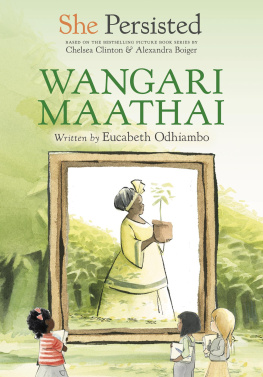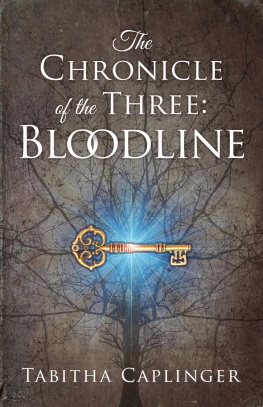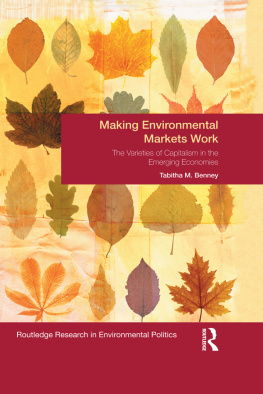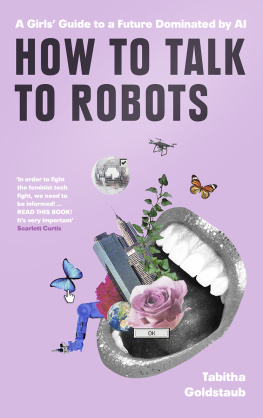Tabitha Kanogo - Wangari Maathai
Here you can read online Tabitha Kanogo - Wangari Maathai full text of the book (entire story) in english for free. Download pdf and epub, get meaning, cover and reviews about this ebook. publisher: Ohio University Press, genre: Politics. Description of the work, (preface) as well as reviews are available. Best literature library LitArk.com created for fans of good reading and offers a wide selection of genres:
Romance novel
Science fiction
Adventure
Detective
Science
History
Home and family
Prose
Art
Politics
Computer
Non-fiction
Religion
Business
Children
Humor
Choose a favorite category and find really read worthwhile books. Enjoy immersion in the world of imagination, feel the emotions of the characters or learn something new for yourself, make an fascinating discovery.

- Book:Wangari Maathai
- Author:
- Publisher:Ohio University Press
- Genre:
- Rating:3 / 5
- Favourites:Add to favourites
- Your mark:
- 60
- 1
- 2
- 3
- 4
- 5
Wangari Maathai: summary, description and annotation
We offer to read an annotation, description, summary or preface (depends on what the author of the book "Wangari Maathai" wrote himself). If you haven't found the necessary information about the book — write in the comments, we will try to find it.
Wangari Maathai — read online for free the complete book (whole text) full work
Below is the text of the book, divided by pages. System saving the place of the last page read, allows you to conveniently read the book "Wangari Maathai" online for free, without having to search again every time where you left off. Put a bookmark, and you can go to the page where you finished reading at any time.
Font size:
Interval:
Bookmark:
Wangari Maathai
OHIO SHORT HISTORIES OF AFRICA
This series of Ohio Short Histories of Africa is meant for those who are looking for a brief but lively introduction to a wide range of topics in African history, politics, and biography, written by some of the leading experts in their fields.
Steve Biko
by Lindy Wilson
Spear of the Nation (Umkhonto weSizwe): South Africas Liberation Army, 1960s1990s
by Janet Cherry
Epidemics: The Story of South Africas Five Most Lethal Human Diseases
by Howard Phillips
South Africas Struggle for Human Rights
by Saul Dubow
San Rock Art
by J.D. Lewis-Williams
Ingrid Jonker: Poet under Apartheid
by Louise Viljoen
The ANC Youth League
by Clive Glaser
Govan Mbeki
by Colin Bundy
The Idea of the ANC
by Anthony Butler
Emperor Haile Selassie
by Bereket Habte Selassie
Thomas Sankara: An African Revolutionary
by Ernest Harsch
Patrice Lumumba
by Georges Nzongola-Ntalaja
Short-changed? South Africa since Apartheid
by Colin Bundy
The ANC Womens League: Sex, Gender and Politics
by Shireen Hassim
The Soweto Uprising
by Noor Nieftagodien
Frantz Fanon: Toward a Revolutionary Humanism
by Christopher J. Lee
Ellen Johnson Sirleaf
by Pamela Scully
Ken Saro-Wiwa
by Roy Doron and Toyin Falola
South Sudan: A New History for a New Nation
by Douglas H. Johnson
Julius Nyerere
by Paul Bjerk
Thabo Mbeki
by Adekeye Adebajo
Robert Mugabe
by Sue Onslow and Martin Plaut
Albert Luthuli
by Robert Trent Vinson
Boko Haram
by Brandon Kendhammer and Carmen McCain
A Short History of Chinua Achebes Things Fall Apart
by Terri Ochiagha
Amlcar Cabral
by Peter Karibe Mendy
Wangari Maathai
by Tabitha Kanogo
Josie Mpama/Palmer: Get Up and Get Moving
by Robert R. Edgar
Female Monarchs and Merchant Queens in Africa
by Nwando Achebe
Wangari Maathai
Tabitha Kanogo
OHIO UNIVERSITY PRESS
ATHENS
Ohio University Press, Athens, Ohio 45701
ohioswallow.com
2020 by Ohio University Press
All rights reserved
To obtain permission to quote, reprint, or otherwise reproduce or distribute material from Ohio University Press publications, please contact our rights and permissions department at (740) 593-1154 or (740) 593-4536 (fax).
Printed in the United States of America
Ohio University Press books are printed on acid-free paper 
30 29 28 27 26 25 24 23 22 21 20 5 4 3 2 1
Library of Congress Cataloging-in-Publication Data
Names: Kanogo, Tabitha M., author.
Title: Wangari Maathai / Tabitha Kanogo.
Description: Athens, Ohio : Ohio University Press, 2020. | Series: Ohio short histories of Africa | Includes bibliographical references and index.
Identifiers: LCCN 2019059716 | ISBN 9780821424179 (paperback) | ISBN 9780821440711 (adobe pdf)
Subjects: LCSH: Maathai, Wangari. | Green Belt Movement (Society : Kenya) | Women conservationists--Kenya--Biography. | Women politicians--Kenya--Biography. | Nobel Prize winners--Kenya--Biography.
Classification: LCC SB63.M22 K36 2020 | DDC 333.72092--dc23
LC record available at https://lccn.loc.gov/2019059716
Contents
Acknowledgments
I wish to thank Gillian Berchowitz for her patience during the preparation of this book. I join many in recognizing her outstanding support for African studies. Ricky Huard oversaw the final editing of the manuscript. I am also grateful to the anonymous readers whose candid comments I found useful in the later stages of preparing the book. This work is a tribute to the women of Kenya, especially female Mau Mau veterans, whose valor was altruistic.
May 30, 2019 Berkeley, California
Abbreviations
| ACK | Anglican Church of Kenya |
| AG | attorney general |
| FORD | Forum for the Restoration of Democracy |
| GBM | Green Belt Movement |
| IPOA | Independent Policing Oversight Authority |
| KADU | Kenya African Democratic Union |
| KANU | Kenya African National Union |
| KEM | Kikuyu, Embu, and Meru |
| KNA | Kenya National Archives |
| KPSA | Kikuyu Private Schools Association |
| KPU | Kenya Peoples Union |
| MYW | Maendeleo ya Wanawake |
| NARC | National Rainbow Coalition |
| NCWK | National Council of Women of Kenya |
| NGOs | nongovernmental organizations |
| PC | provincial commissioner |
| UKC | United Kenya Club |
| UN | United Nations |
| UNDP | United Nations Development Programme |
| UNESCO | United Nations Educational, Scientific and Cultural Organization |
| UNEP | United Nations Environment Programme |
| UNIFEM | United Nations Development Fund for Women |
| WMF | Wangari Maathai Foundation |
| wPOWER | Partnership on Womens Entrepreneurship in Renewables |
Introduction
Wangari Maathai, the Global Icon
In presenting the Nobel Peace Prize to Professor Wangari Muta Maathai in 2004, Ole Danbolt Mjoes, chair of the Norwegian Nobel Committee, alluded to the multidimensional nature of this remarkable womans public career: Peace on earth depends on our ability to secure our living environment. Maathai stands at the front of the fight to promote ecologically viable social, economic, and cultural development in Kenya and in Africa. She has taken a holistic approach to sustainable development that embraces democracy, human rights and womens rights in particular. She thinks globally and acts locally.
For over three decades, Wangari Maathai waged a fierce battle for environmental conservation, human rights, democracy, sustainable development, gender equity, and the eradication of poverty. This activism put her on a collision course with the Kenyan government from 1978 to 2002, as the regime became increasingly authoritarian and corrupt and progressively failed to deliver basic services to the majority of the population. For Maathai, corruption was lethal. She captured her ire toward the vice in these words:
If it is a crime to kill a million people in Rwanda in 1994, it should be a crime to steal millions of dollars from ordinary Africans, thereby causing the death [of] millions of innocent people through sustained hunger and malnutrition, lack of adequate health care, and inflationary prices which make it impossible for millions of Africans to provide their families with basic needs. Why is this type of a crime tolerated by the international community? Why is the victim to blame while the culprit goes free and lives in comfort?
An activist most of her adult life in Kenya, Maathai paid heavily for her outspoken and at times biting criticism of the government. But at the same time, she acquired global recognition and inspired millions to commit to protecting and rejuvenating the environment by planting trees. She birthed and nurtured the Green Belt Movement (GBM), renowned for planting over 50 million trees in Kenya. For Maathai, to plant a tree was to plant hope and peace. At the time of her death in 2011, the movement had mushroomed into a multipronged organization that continued to promote a holistic approach in focusing on environmental protection, the strengthening of rural communities, and the economic empowerment of those involved in the movement; today, GBM has chapters all over the world. Maathai had a heightened sense of urgency regarding the need to conserve the environment. She believed that it was not a matter for tomorrow and that the environment is [an] everyday issue... the air we breathe.
Next pageFont size:
Interval:
Bookmark:
Similar books «Wangari Maathai»
Look at similar books to Wangari Maathai. We have selected literature similar in name and meaning in the hope of providing readers with more options to find new, interesting, not yet read works.
Discussion, reviews of the book Wangari Maathai and just readers' own opinions. Leave your comments, write what you think about the work, its meaning or the main characters. Specify what exactly you liked and what you didn't like, and why you think so.







